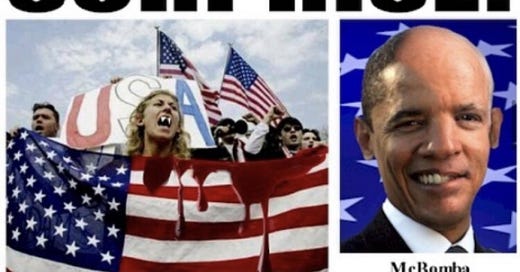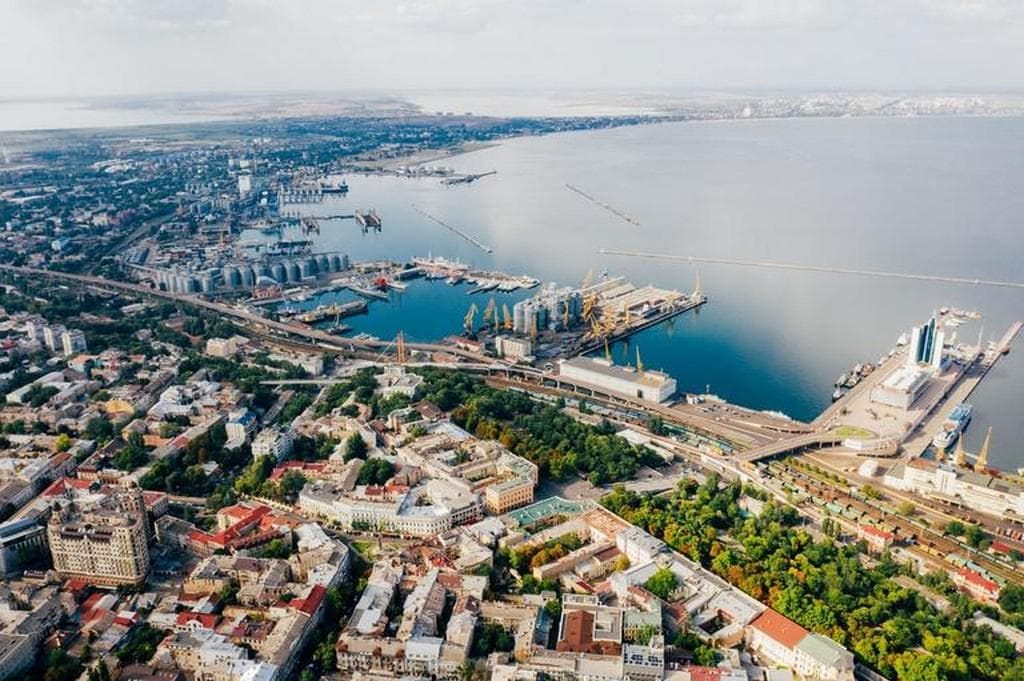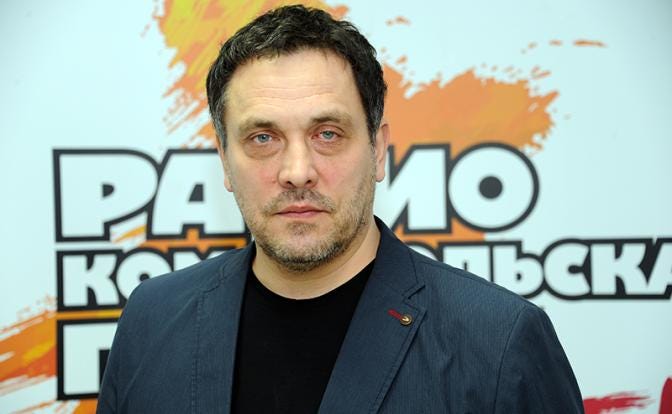The 51st state weighs in
The US elections: the view from Odessa and Pokrovsk. Surkov, Tucker Carlson, and Maksym Shevchenko - will there be a global North?
I work with a group of professionals mainly from East Timor and Colombia. This morning, they told me they were certain that Trump would win the US elections - at the time, I said I didn’t have much of an opinion, but I should have. Listen to global south voices!
Onto another exotic location - let’s see who Odessans are voting for in these US elections. It isn’t called the Black Sea Miami for nothing:

The Donbass swing state
Sure, Americans are voting for their next president - but what do residents of Ukraine’s Pokrovsk think?

In today’s daily Radio Free Europe Ukraine (Radio Svoboda) news feed, they interviewed some locals at this strategically crucial city - a frontline swing city, one might say. I translated the segment:
They're shooting, they're shooting loudly. You can hear it yourself. This is constant.
We've already gotten used to it; before, of course, we would run to the bomb shelter. Now we're already accustomed to it.
Iryna's family has moved away from the frontline, but she is still staying here. A few hours a day, as long as there’s no curfew in the city, she sells essential goods: gas for burners, a few warm socks that are left. I'm not ordering anything new, just selling what's left. My parents also scold me, saying, 'How long are you going to stay here?' I tell them, 'Well, I don’t know, as long as I’m here.'
Sales today aren’t great. Iryna wonders if people have run out of cash. In Pokrovsk, ATMs stopped working yesterday, even though many people still live in this frontline city. According to official data, over 12,000 residents remain. Most of them rely on humanitarian aid. In the lines for aid, all the conversations are about the war, but more often about peace.
Some people are pinning their hopes on the American elections, hoping the newly elected president overseas might somehow bring about a ceasefire here in Donbas.
'There has to be a truce of some sort; they must stabilize it all,' Lyudmila says. 'Everyone is tired of all this. We’re sitting on a powder keg here.’
Aidar said ‘Of course, I don’t want to lose any Ukrainian territory, but I don’t see another way. We’ll need to negotiate, because there have already been so many deaths, so many fallen, and I feel sorry for our guys, the soldiers of the armed forces. And on the other side, too, people are dying by the thousands.'
Those who remain, half the city, are hoping for a miracle, though what exactly, we don’t know. But we believe. Fortune tellers are saying that everything will stop just before Pokrovsk, and that’s it.
Oleksiy Prodayvoda, Mykola Ryshchenko, and Oleksiy Palii for Radio Liberty. It's incredible, but people living close to the front also have hopes for the U.S. elections, and it’s very logical. I remind you again, the United States is a key partner, and as Volodymyr Zelensky once said, if U.S. support suddenly stops, Ukraine has no chance of victory. It's important to note this.
Betrictory
What about the pocket-ultranationalists patronized by Zelensky like Lachen , who spends most of his time posting gore photos of dead Russians with guts spilling out to his millions of followers? He isn’t happy about the elections:
But plenty of Ukrainian militarists at the frontline (unlike the young draft-dodging degenerate Lachen) aren’t so worried about the prospects of Trump. ‘Bakhmut Demon’ posted “Trump is winning - lets get ready for rockets against Moscow”. I’ve written about this before - Trump might be just as likely to end the war in Ukraine as he is to escalate it. Or even, moreso the second option.
The doctrine of unpredictability
Radio Svoboda also had a segment discussing what Trump or Kamala could look like for Ukraine. Here it is:
RS: Joining our broadcast is Oleksandr Kraiev, Director of the North America Program at the Ukrainian Foreign Policy Council 'Prism'.
Oleksandr, it’s been a while since we’ve had you. Nice to see and hear you.
Kraiev: Good evening, I’m glad to join you.
RS: So, Donald Trump recently, in one of his last interviews, or one of his last ones here, proudly retold a conversation he allegedly had with the Kremlin’s head, Vladimir Putin, where he supposedly threatened strikes on Moscow over Ukraine or the war in Ukraine. Do we have that fragment? We can briefly remind our audience and discuss it.
'I said, "Vladimir, if you go into Ukraine, I’ll hit you so hard, you won’t even believe it. I’m going to hit you right in the middle of Moscow." We’re friends; I don’t want to do this, but I have no choice.'
Well, journalists don't provide, and he didn’t give, details of when this conversation happened. But let’s discuss. Could this rhetoric indicate Trump’s willingness to speak harshly with Putin and force him to withdraw troops from Ukraine, or should we not take candidate Trump's rhetoric as potentially aligning with a President Trump’s rhetoric if he becomes one?
Kraiev: There are two ways to assess this. First, everything Trump says now is only meant to win the election. He said it, I remember his quote, in that interview exactly when Biden couldn’t agree on a new support package for Ukraine, that is, when Biden seemed weak regarding Ukraine, and Democrats were generally weak in their support. Trump begins saying that no one would handle Ukraine better than he would, only he is ready to be Ukraine's defender, only he knows how to help Ukraine, only he understands our problems and how to make the world better.
But let's also remember 2016, when Trump says something, and people think it’s a joke or mere campaign rhetoric, and then he unexpectedly starts implementing it. So, as one of my colleagues in the U.S. says, when Trump says something strange, it's better to believe him. This kind of conversation could have happened, and Trump would want to boast about such a conversation. But does it mean he will do the same if he becomes president? Not necessarily. The only takeaway from this statement is that he would like to one-up Vladimir Putin on Ukraine, to raise his image by this means.
Does it mean he’s genuinely ready to do something for this? Unfortunately, we have no answer to this question.
RS: You also don’t have an answer? No one has any answers!
Kraiev: Trump is unpredictable in his predictability. I am currently researching, and within my dissertation at the Kyiv-Mohyla Academy, I'm asserting that the only doctrine that explains him is the doctrine of unpredictability, meaning each subsequent step should be as inconsistent as possible with the previous ones, but the inconsistency must be deliberate. Trump fully fits this doctrine.
What do I think?
I’ve written here before here about my skepticism regarding Trump. Putin famously said a couple months back that he prefers Kamala/Biden to Trump because of the predictability of the democrats. As much as I might want to believe Trump’s promises about ‘ending the war in Ukraine in a day’ - let’s keep in mind that he’s also saying he’ll stop the war in Gaza - and with a straight face! Meanwhile, his son-in-law never shuts up about his fantastic plans for seaside real estate in ex-Gaza, and Trump himself describes himself as ‘Israel’s greatest protector’. (A note to the reader: If Trump actually does stop the war in Gaza, I will renounce my skepticism)
Personally, this is what I predict happening if Trump gets into office (if the ‘if’ is even necessary at this point). Trump proposes Putin a ‘compromise deal’ in Ukraine. Putin refuses, given that he’s winning on the battlefield - see my military newsletters. Trump is enraged by this loss of face, and encouraged by his Ukraine hawk advisors like Pompeo (who called for a "$500 billion lend-lease for Ukraine” this July), what does he do next? De-escalate? Hard to believe.
Americans are always the masters of lies. Every president campaigns on ending the wars and cutting taxes. Asides from cynicism, I think that Americans of the entire political spectrum still don’t quite understand the extent to which the global balance of forces is shifting.
Probably my favorite commentary on this year’s Tucker Carlson interview with Vladimir Putin came from Maksym Shevchenko, a well-known Russian politician and political commentator (with left-wing nationalist views, an unofficial Hamas ambassador in Moscow, friend of everyone from Arab nationalists to Russian liberals).
Shevchenko argued that the interview was being misunderstood - everyone was worrying about whether Putin’s long discussion of ancient Russian history would actually be compelling to the Americans watching Tucker’s interview. But this missed the point - the purpose of this endless historical excursus, which clearly enraged and confused Mr Carlson, was precisely to enrage and confuse.
What Shevchenko meant was the following. Tucker was sent to Russia by Trump with the aim of coming to a geopolitical agreement with the Russian government. There are plenty of speculations that there are sections in the republicans that want to split Russia away from China and the Global South generally, so as to guarantee US supremacy in the struggle against the global majority. And there are voices in the Russian elite that support such an idea - the extremely influential (perhaps not so much anymore) Vladyslav Surkov published an article called ‘Here’s why Russia will eventually ally with the US and EU’ in 2023. After reflecting on current geopolitical rivalry between Russia and the west, Surkov writes:
What can we see ahead if we try to look beyond the mirage? What will happen if we remove the false pieces from the chessboard?
There will be the Great North – Russia, the United States, and Western Europe – forming a common socio-cultural space. A tripartite northern geopolitical cluster.
The premonition of the North has already manifested itself in the increasingly frequent use of the term 'Global South'. And there is no South without the North.
…
All participants in this process are experiencing and will continue to experience tragic transformations until they begin to fit together in a common historical project. This has taken centuries and will take many more decades.
…
The Great North is neither utopia nor dystopia; it will be neither an idyll nor a dystopia. It will be full of contradictions – yet obsessed with the unifying idea of collective leadership.
Anyway, back to the Tucker-Carlson meeting. It began with Tucker, that ‘failed CIA agent’ per his own story (or maybe just a fairly inept employed agent?), asking Putin why he launched his ‘Special Military Operation’ into Ukraine in February 2022. No doubt he was hoping to hear plenty about the stupid senile Biden and his team of unhinged black transvestites. Instead, Putin talked for 45 minutes about Bohdan Khmelnitsky, the Grand Duchy of Lithuania, King Sigismund of the Polish-Lithuanian Commonwealth, and Vladimir Lenin’s pernicious role in the formation of Ukrainian nationhood.
Shevchenko argues that far from an outburst of historical enthusiasm - Putin is hardly a particularly emotional man - this was entirely purposeful. The whole point was to give these arrogant Americans a firm, icy nyet - we don’t care about your offers, we will take what is ours. Ukraine is ours, and always has been - let me give you 45 minutes of historical exegesis that you will never understand, being a stupid anglosaxon - but you don’t need to understand it, and you shouldn’t understand it, because it’s none of your business.
Russia is winning on the frontline, and some Trumpian salesman oil won’t change this. All this brings me to my favorite part of the Tucker-Putin interview - a mediocre CIA agent asks a veteran KGB operative his thoughts on the existence of God and the supernatural:
The formation of a Russia-inclusive global North seems about as likely to me as Tucker’s claimed nighttime demonic assault. At least, not until Russia achieves its strategic goals in Ukraine, which won’t happen straight away. And by that time, plenty could change in the world. And in the meantime, China and the global south is proving a much better partner than the euro-atlantic world ever was
I’ll leave the reader on a happy note












I believe Russia is under a lot of pressure from China. Witness the conditions China demanded to get the gas that formerly went to Europe. There were negotiations for two years to build a pipeline thru Mongolia but at the last minute talks were broken off as China had posed impossible conditions. That was in July and furthermore China has restricted the amount of business Chinese banks can do with Russia. Supposedly under US pressure. No, I think that some sort of compromise over Ukraine is possible and I don´t think Putin will want to get all of Ukraine. That is not how I read the Tucker interview. Goldilocks for Putin would be some Ukrainian strongman that talks Nationalist but follows the Russian lead. Some sort of Ukrainian Petain. Salushni would be perfect for this role.
I do not believe in this "common north civilization identity" stuff. The reason that Russia, starting with Peter, started moving in the direction of identifying with Western Europe is that, at the time, the Western European powers were the most successful and hence were an obvious model to follow. It is however not the 18th century, or 19th, or 20th -- Europe in 2024 is at a 400-year historical nadir. Why would anybody want to identify with these people? The success stories of the modern period are China and, well, Russia itself